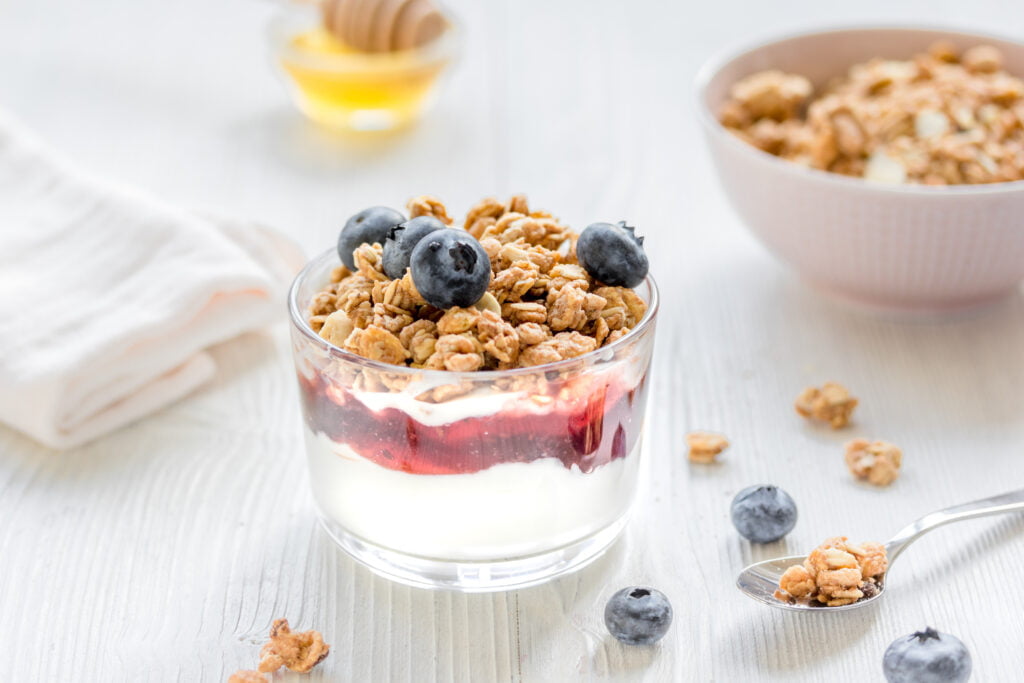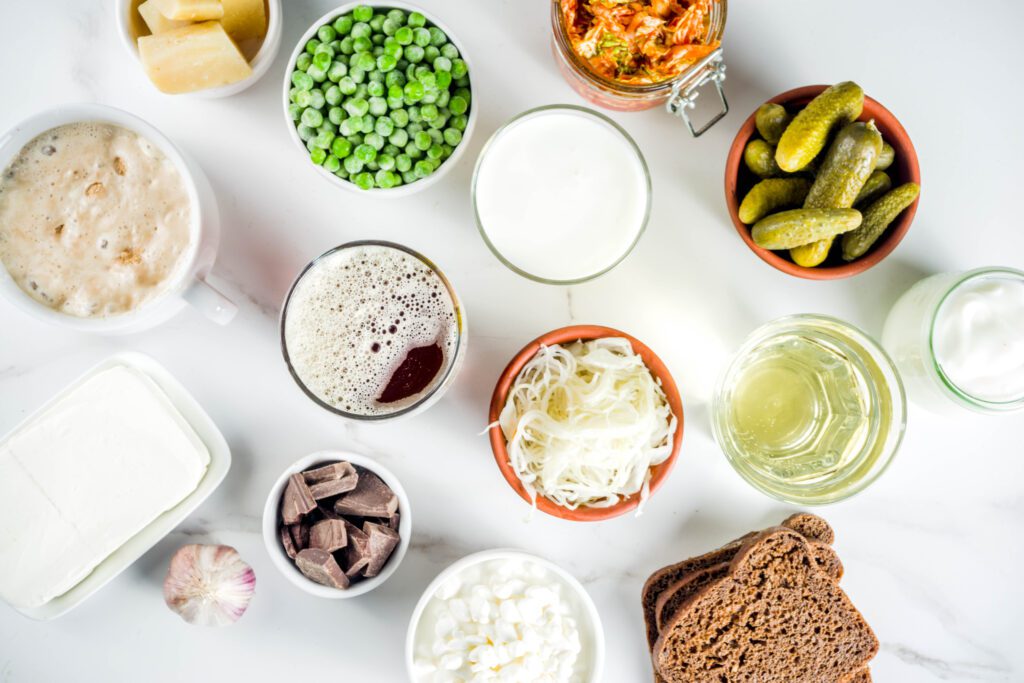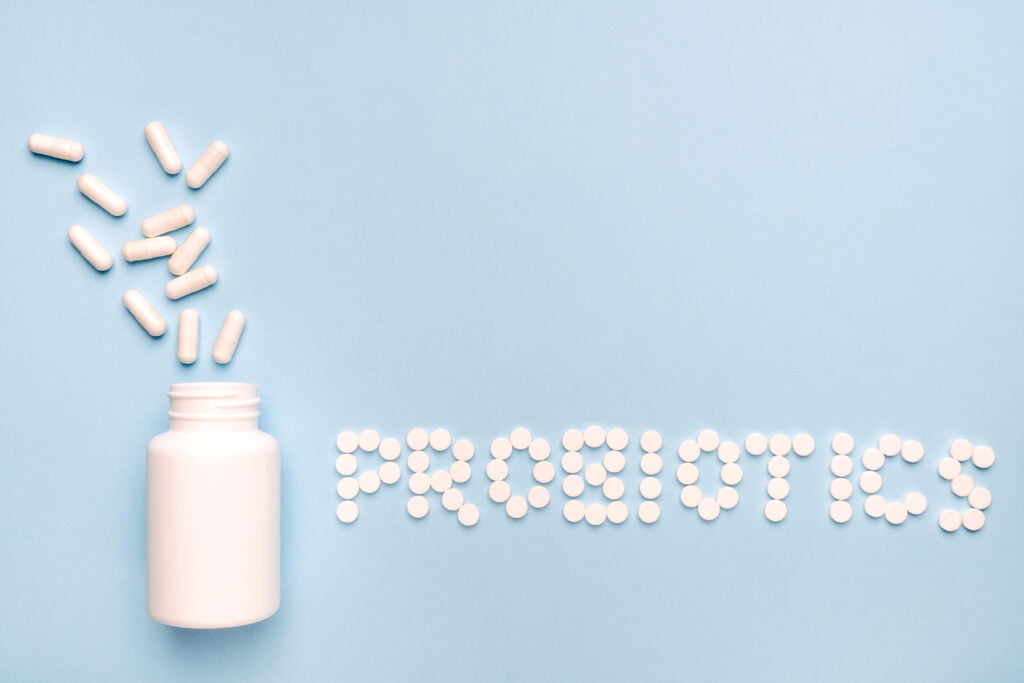Do all Yogurts have Probiotics
Probiotics have been gaining popularity as a way to improve digestive health, but what exactly are they? And do all yogurts have probiotics? When consumed, probiotics can provide a variety of health benefits including improved immunity, better digestion and increased nutrient absorption. They can also reduce the risk of certain illnesses like allergies, asthma and even obesity. Additionally, some studies suggest that they may help with mental health issues like depression and anxiety.
Not only can consuming probiotic-rich foods improve your physical wellbeing but it can also positively affect gut health as well as your overall mood and energy levels due to its positive influence on the microbiome in the gut.

What are Probiotics and Do all Yogurts have Probiotics
Probiotics are a type of beneficial bacteria that can be found in some foods and supplements. Although probiotics are most commonly associated with yogurt, not all yogurts contain them. So, what exactly are probiotics and why are they important?
Probiotics provide many health benefits, such as aiding digestion, helping to maintain the balance of good bacteria in the gut and even boosting our immunity. They’re found in fermented foods like yogurt, kimchi and sauerkraut as well as certain dietary supplements like capsules or powder form. Some research has suggested that taking probiotic supplements may improve overall digestive health, though more studies need to be done before any definitive conclusions can be made.
When it comes to choosing a yogurt for its probiotic content, read the label carefully because not all yogurts have them.
Dairy Yogurt
Do all yogurts have probiotics? It’s a question that many people ask as they’re shopping for their favorite yogurt.
Dairy yogurt is one type of yogurt that often contains probiotics. This includes Greek-style and traditional plain varieties made with cow’s milk or other animal milks like sheep or goat milk. These yogurts may also be labeled as “live active cultures,” which indicates they contain the beneficial bacteria associated with many health benefits.
Non-Dairy Yogurt
Are you trying to find a delicious yogurt that is also dairy-free? Non-dairy yogurt has come to the rescue! Non-dairy yogurts are made using plant-based ingredients like almond, cashew or coconut milk and can be found in many grocery stores. Not only are they a tasty snack, but do all yogurts have probiotics?
The answer is: it depends. You’ll have to check the label on each type of non-dairy yogurt to see if probiotics are added during production. Even though not all types of non-dairy yogurt contain probiotics, they still offer other health benefits like providing lots of protein, calcium and vitamins A, D and B12. Plus, most varieties are low in saturated fat and cholesterol free – making them a great choice for those who follow plant-based diets.
Why Don’t all Yogurts Contain Probiotics
For many, yogurt is a go-to when it comes to healthy snacks – after all, the dairy product contains protein and calcium, as well as probiotics. But do all yogurts have probiotics? Not necessarily.
Probiotic bacteria are naturally found in some fermented food products, such as yogurt and other milk-based products. Unfortunately, not all yogurts contain these beneficial bacteria; for a yogurt to be considered “probiotic” it must contain at least one specific strain of probiotic bacteria like Lactobacillus acidophilus or Bifidobacterium lactis. In order for those beneficial strains of bacteria to remain viable in a food product it must also have an acidic pH level, which many commercially produced yogurts don’t achieve organically.
Pasteurized Milk
The majority of yogurts sold in supermarkets contains pasteurized milk, which means that any naturally occurring probiotic bacteria have been killed off by the pasteurization process. If you want to get the full benefit of probiotics from your yogurt, make sure to look for labels that say “contains live active cultures”.
Prebiotics vs Probiotics
Probiotics are all the rage these days, but what about prebiotics? These two nutritional supplements have very different benefits and understanding the differences between them can help you decide which one is right for you.
Prebiotics are indigestible fibers found naturally in certain foods such as bananas, onions and garlic. They act as food for beneficial bacteria that live in your gut, helping to promote a healthy gut microbiome. Probiotics on the other hand are live microorganisms typically found in fermented foods such as yogurt, sauerkraut and kimchi. These organisms can also help improve your gut health, but they work differently than prebiotics by directly introducing beneficial bacteria into your system.
Benefits of Probiotics
The benefits of probiotics range from helping to regulate your digestive system, improving immune system function, reducing cholesterol levels, boosting energy levels, and even alleviating depression symptoms. Additionally, research has shown that probiotics are effective in treating skin conditions such as acne and eczema.
Overall, it is clear that there are many potential health benefits associated with taking probiotic supplements or eating foods rich in these beneficial bacteria. Here’s why you should consider adding probiotics to your diet.
Balance Your Gut
Firstly, probiotics can help regulate digestion and support your gut microbiome. When taken regularly, these beneficial bacteria can help balance out the bad bacteria that sometimes cause bloating, constipation, diarrhea or other digestive issues.
Reduce Inflammation
Additionally, probiotics may also reduce inflammation levels throughout your body which promotes better overall health. This is particularly important for those who suffer from chronic conditions that involve frequent inflammation.
Boost Immune System
Another benefit of probiotics is their ability to boost the immune system. Research has shown that they can help reduce colds, flu and other illnesses by boosting your body’s natural defenses.
Improve Skin Health
Probiotics may help improve skin health by supporting the skin’s natural bacteria levels and promoting healthy skin. Probiotics can also help reduce acne and dandruff by stopping the growth of yeast on your scalp.
Vaginal Health
Probiotics can help balance the natural bacteria levels in your vagina, known as vaginal flora. This is important for maintaining a healthy reproductive system and protecting against yeast infections and bacterial vaginosis.
Depression
Depression is a serious mental health disorder that affects millions of people around the world. It can manifest as a range of symptoms, from low mood and loss of motivation to physical pain and difficulty concentrating. While there are many treatments available for depression, research has recently suggested that probiotics may be an effective form of therapy.
Studies have demonstrated how certain strains of probiotic bacteria could potentially reduce inflammation associated with depression while also helping regulate hormones like serotonin which play a role in mood regulation. Additionally, probiotics have been found to improve gut health which could help alleviate some symptoms associated with depression such as fatigue or digestive issues.
Risks of Probiotics
It’s worth noting that there are potential risks associated with taking probiotics. The most common being an upset stomach or diarrhea as well as interference with certain medications like antibiotics and immunosuppressive drugs for transplant recipients. That said, for most healthy adults these side effects are generally mild and infrequent – but always consult your doctor if you have any concerns about taking probiotic supplements or eating foods with live cultures.
Labels and Regulations: Do all Yogurts have Probiotics?
Navigating labels and regulations on food products can be daunting for consumers, especially when the claims made by marketers or manufacturers appear to be too good to be true. For example, do all yogurts contain probiotics, as claimed? It turns out that it is not an easy question to answer.
To begin with, there are labeling regulations in place for health claims related to probiotics in yogurt products. In Europe and the United States, such claims must meet certain criteria set by governing bodies and include scientific evidence regarding their health benefits. In other words, before a product can claim to contain probiotics or any other type of beneficial bacteria, there must be scientific studies showing proof of those benefits.
Foods Rich in Probiotics
Are you looking to add more probiotics to your diet? Probiotics are essential for gut health and a number of other bodily functions, but where do you find them? Many people assume that all yogurts have probiotics, but this isn’t necessarily true. While yogurt is a great source of probiotic-rich foods, there are plenty of other options that can be just as beneficial!

Kefir
Kefir is a fermented milk drink that’s been around for centuries, but it’s only recently caught the attention of health nuts. This tart and tangy beverage has powerful probiotic properties that help keep your gut healthy.
Kefir is made with kefir grains, which are actually colonies of yeast and lactic acid bacteria. When added to milk, these grains ferment the mixture into a creamy liquid filled with beneficial bacteria and other compounds. It has a similar consistency to yoghurt but tends to be less sweet and more sour tasting.
You can buy pre-made kefir or easily make your own at home if you have some kefir grains on hand – all you need to do is add the grains to milk in a jar, leave it overnight, strain it off in the morning and voila!
Sauerkraut
Sauerkraut is one of those classic dishes that people have been eating for centuries. It’s a type of fermented cabbage that originated in Germany, but today can be found all over the world. The process of fermenting cabbage creates a dish that is full of flavor and packed with probiotics, making it not only delicious but healthy too.
Sauerkraut can be enjoyed as part of a meal or eaten on its own as an appetizer or snack. You can buy it in jars from most supermarkets, but if you’re feeling adventurous why not try making your own? All you need is some white cabbage, salt and a bit of time – the end results are worth it! To make sauerkraut even more tasty you could add other vegetables such as carrots or onions to the mix.
Pickles: A Superfood for your Gut Health?
Pickles are a beloved condiment—but did you know they could also be good for your gut health? Recent research suggests that the probiotics found in pickles may help improve digestive health and boost immunity.
Probiotics are live microorganisms, such as certain bacteria and yeasts, that can provide a range of health benefits when consumed. Studies have shown that probiotics can improve digestion by increasing beneficial bacteria in the gut microbiome. They’re also known to reduce inflammation, increase nutrient absorption, and support overall gastrointestinal health.
So, if you’re looking to get some extra probiotic goodness into your diet, why not give pickles a try!
Tempeh
Tempeh is a great vegan alternative to meat. It is made from fermented soybeans and has a unique flavor and texture that make it an interesting addition to any dish. Whether you’re already vegan, vegetarian, or just looking for more plant-based options in your diet, tempeh may be the perfect choice for you.
Tempeh offers a wide range of nutritional benefits due to its high protein content and probiotics from the fermentation process. It contains vitamins B12 and K2, magnesium, phosphorus and zinc – all important nutrients for overall health. Additionally, tempeh provides essential fatty acids which are known to reduce inflammation in the body. Not only is it delicious but it also helps promote good heart health and digestion!
Kombucha
Kombucha is a type of fermented tea that has been around for hundreds of years. This beverage has recently gained a lot of popularity among health enthusiasts. This is because of its many potential health benefits. Namely aiding in digestion and boosting the immune system. Kombucha is packed with probiotics, which are beneficial bacteria and yeast that can help support your gut health.
Probiotics are one of the main components in kombucha. When you drink this fizzy tea, you’ll get a dose of healthy microorganisms that can help your digestive system work better. This will promote overall wellbeing. Additionally, kombucha contains antioxidants, B vitamins, enzymes, and organic acids that may reduce inflammation while providing energy-boosting benefits.
Buttermilk
Buttermilk has been a staple in many diets for centuries. It provides a rich and creamy flavor to foods like pancakes, biscuits, and fried chicken. But the health benefits of buttermilk don’t stop at just its great taste – it’s also packed with probiotics.
Regularly consuming probiotic-rich foods is a great way to keep your body healthy and strong. Buttermilk is an excellent source of these helpful bacteria thanks to its fermentation process. This process allows the lactic acid bacteria to turn milk into buttermilk and create the sour flavor we all love. Not only does this make it easy for your digestive system to break down, but you get all the nutritive benefits of probiotics without having to take any additional supplements or medications!
Miso
Miso is a traditional Japanese seasoning made of fermented soybeans and grains, most often rice or barley. Not only does it add an umami flavor to various dishes, but it also packs a nutritional punch with loads of vitamins and minerals.
Aside from its health benefits, miso is also known for being rich in probiotics that can help keep our digestive systems running smoothly. By consuming probiotic-rich foods like miso, we’re supporting the growth of beneficial bacteria in our gut which helps to break down food and absorb nutrients more effectively.
In addition to being a tasty seasoning for soups and sauces, miso can be used as a base for salad dressings. It can even be added on top of veggies for added flavor! Be sure to have some miso handy next time you’re looking for a healthy boost—it tastes great too!
Whole Grains
Whole grains—known as an important part of a healthy diet—are packed full of fiber, vitamins, and minerals. But now researchers are finding that whole grains also contain probiotics, which can provide numerous health benefits.
Studies have found that wheat, barley, and rye all contain probiotics that can be transferred to the gut when eaten. Eating a variety of whole grains is one way to incorporate more probiotics into your diet without having to drink or eat anything strange. Adding some amaranth or farro to your plate could make a huge difference for your gut health!
Some Fruits
Bananas
Bananas have been found to be full of probiotic properties. As one of the world’s most popular fruits, it is readily available at any grocery store. Not only do bananas make for a great snack or addition to breakfast cereals. They also contain good bacteria that helps with digestion and boosts your immune system.
Berries
Berries such as raspberries, blueberries and cranberries are also excellent sources of probiotics. They are not only high in fiber and antioxidants, but they are a great source of gut health. Studies have shown that the natural sugars found in berries can be very helpful in killing bad bacteria. They also help to keep you regular by aiding digestion and inhibiting the growth of bad bacteria.
Probiotic Supplements
With so many kinds of probiotic supplements on the market, it can be hard to know what type is right for you. Probiotic America offers a wide variety of probiotic supplements that are formulated with different strains of beneficial bacteria to meet your specific health needs. The strains found in Probiotics America supplements have been clinically studied and are effective in helping to heal the digestive system and maintain good gut health.

There are three main types of probiotic supplements: capsules or tablets, powders, and liquids. Each one has its own advantages depending on your individual needs. Capsules or tablets are an easy way to get your daily dose of probiotics. These are found in an easy-to-swallow form that you can take with you anywhere. Powders provide a higher concentration of probiotics than capsules and act quickly in the body. This is perfect for those who need an immediate boost. And finally, liquid probiotics offer maximum absorption into the bloodstream, so they work faster than other forms.
Final Thoughts on Do All Yogurts Have Probiotics
As we come to the end of our article on whether or not all yogurts contain probiotics, it’s time to review our findings. To start off, no, not all yogurts have probiotics in them. Many commercial brands of yogurt that you find on store shelves are made with pasteurized milk and heat-treated after culturing. This destroys any living bacteria present in the yogurt, making these products much less healthy than other options available.
On the other hand, some yogurts do contain probiotics – those that are labeled “live & active cultures.” These yogurts usually have been produced with raw milk and fermented for a longer period of time. This allows the live bacteria to remain alive during processing and packaging. They provide more health benefits than regular yogurt due to their concentration of beneficial bacteria which can support digestion and immunity.





